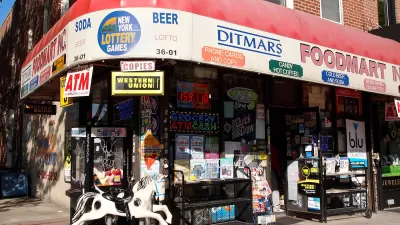A new study reveals the personality traits that draw people to certain urban environments.

Richard Florida shares news of a new study in the Proceedings of the National Academy of Sciences (PNAS) that explores how people characterized by specific personality traits tend to cluster in neighborhoods clustering. The study characterized individuals according to five basic personality traits defined by the classic five-factor model: openness to experience, extraversion, agreeableness, conscientiousness and emotional stability (or lack of neuroticism).
To provide some insight into the study's findings, Florida shares maps from the study that show the clustering of the five personality types across metro London.
According to Florida, "[the] most clustered personality trait the researchers found was 'openness to experience'...which is concentrated in the center of London. Openness to experience, according to a wide body of psychological studies, is associated with creativity, innovation and entrepreneurship. This type is concentrated in higher density neighborhoods, with higher housing prices, more ethnic and religious diversity and higher crime rates. Meanwhile...there are fewer people open to experience in metro London’s suburbs."
Florida goes on to provide more analysis of the study's findings while also summing up some of the implications of the study, including the importance of the idea that psychological forces shape neighborhoods and metropolitan areas along with the more well-understood forces of economics.
FULL STORY: What Your Personality Has to Do With Your Neighborhood

Alabama: Trump Terminates Settlements for Black Communities Harmed By Raw Sewage
Trump deemed the landmark civil rights agreement “illegal DEI and environmental justice policy.”

Planetizen Federal Action Tracker
A weekly monitor of how Trump’s orders and actions are impacting planners and planning in America.

The 120 Year Old Tiny Home Villages That Sheltered San Francisco’s Earthquake Refugees
More than a century ago, San Francisco mobilized to house thousands of residents displaced by the 1906 earthquake. Could their strategy offer a model for the present?

In Both Crashes and Crime, Public Transportation is Far Safer than Driving
Contrary to popular assumptions, public transportation has far lower crash and crime rates than automobile travel. For safer communities, improve and encourage transit travel.

Report: Zoning Reforms Should Complement Nashville’s Ambitious Transit Plan
Without reform, restrictive zoning codes will limit the impact of the city’s planned transit expansion and could exclude some of the residents who depend on transit the most.

Judge Orders Release of Frozen IRA, IIJA Funding
The decision is a victory for environmental groups who charged that freezing funds for critical infrastructure and disaster response programs caused “real and irreparable harm” to communities.
Urban Design for Planners 1: Software Tools
This six-course series explores essential urban design concepts using open source software and equips planners with the tools they need to participate fully in the urban design process.
Planning for Universal Design
Learn the tools for implementing Universal Design in planning regulations.
Clanton & Associates, Inc.
Jessamine County Fiscal Court
Institute for Housing and Urban Development Studies (IHS)
City of Grandview
Harvard GSD Executive Education
Toledo-Lucas County Plan Commissions
Salt Lake City
NYU Wagner Graduate School of Public Service




























